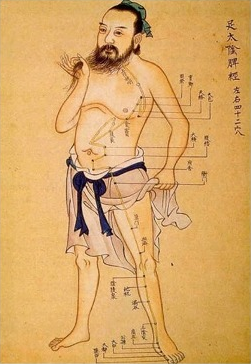If you know much about Traditional Chinese Medicine (TCM), you probably know that acupuncture and TCM practitioners view your internal organs in a much different way than your science-based conventional medicine does. While both frameworks of medicine are important to our health care, TCM is unique in that it views your body as a direct reflection of the world and the universe around it, and vice versa. That is to say that everything that exists within the world and the universe (energy, wind, fire, and so on) also exists inside each of us. With this is mind, each of our major and minor organs play a vital role in connecting us not only to ourselves, but also to each other via nature. But how are these organs viewed in terms of function and, to help illuminate our understanding, how do they differ from what we know about their science-based counterparts? Let's look at the Spleen (capitalized to differentiate from the scientific definition).
1. Anatomically, your spleen is a part of your body's lymphatic drainage system, essentially helping to clean your blood. In TCM, your Spleen is responsible for your digestion, i.e. taking nutrients that you derive from the air and your food, and transforming and then distributing the nutrients (such as energy, aka 'Qi') throughout your body. This is why fatigue and anemia are often linked to a breakdown in your Spleen's functionality.
2. The spleen by scientific standards is a non-vital organ, not affecting your life without much consequence if you have it removed. In TCM, on the other hand, your Spleen is a major organ, with a meridian (a pathway in your body that acts as a channel for Qi, Blood, and other nutrients) that runs from your feet to your chest. In addition to nutrient production, your Spleen is responsible for water metabolism, helping your body rid itself of excess fluids and also nourishing your body where needed. This is how Spleen imbalance explains issues such as edema or weight gain.
3. Scientifically your spleen's functions help your immune system by synthesizing white blood cells. In TCM, your Spleen is responsible for controlling your Blood and ensuring that it flows within the proper meridians and not outside of them. Thus Spleen imbalances can be seen in conditions such as blood in your urine or metrorrhagia (menstrual bleeding that occurs outside of your normal cycle).
4. Filtering your blood while also assisting your immune system fairly sums up your spleen anatomically-speaking, but the Spleen has yet another important function in TCM. By dominating your muscles and limbs, your Spleen is essential to maintaining muscle mass and healthy limbs. Spleen imbalance, therefore, can lead to muscle and limb weakness, and in severe cases even atrophy.
To keep your Spleen healthy, eat a balanced diet rich in fruits and vegetables, and exercise regularly. Nourish your Spleen with foods that are somewhat warm in nature, like ginger.
By Richard Lobbenberg, Acupuncturist and TCM Practitioner













